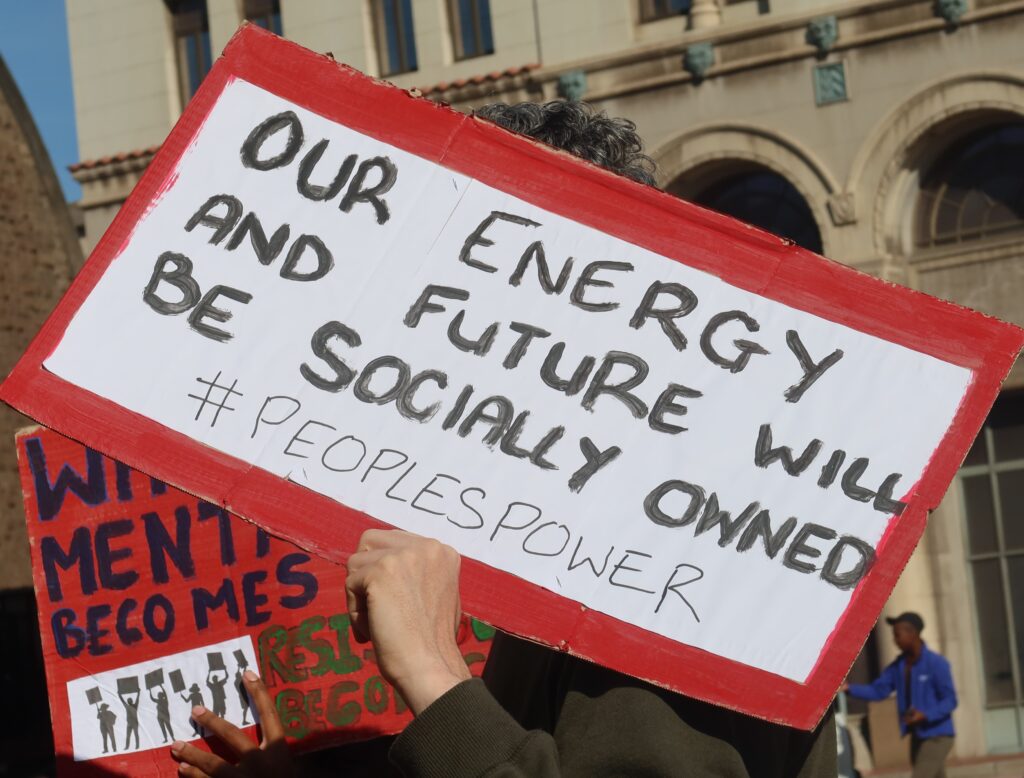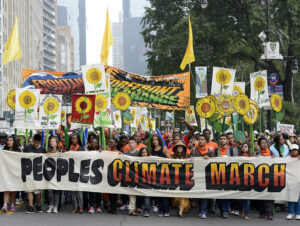
By Tara Nair van Ryneveld
1. Why do we need both a decolonial and eco-socialist response to the converging crises?
The climate crisis requires a multifaceted response. Climate change was caused by a system of industrial capitalism, powered by colonialism and fossil fuels. The expansion of corporations and industries was enabled by the colonial extraction of raw materials. Through colonisation, colonial corporations extracted and enclosed mineral and natural resources, land and people. Simultaneously, colonisation mediated the creation of new markets in the colonies, further encouraging the expansion of industrial capitalism. Clothing is a paradigmatic example. The Natal “Kaffir” commission of 1852-53 made it a requirement to wear “decent” clothing in certain areas, creating a market for British manufacturers to sell European style clothing in South Africa (Magubane 1979, 61). Around 170 years later in South Africa, wearing European clothing now culturally dominates our collective dress code of respectability, regardless of where manufacturing happens. Similarly, we hold the same colonial-era association with mineral extraction as the most acceptable means of wealth generation in our national development ideology (National Planning Commission 2012). These entrenched colonial assumptions of development have eroded our ability to engage with our world, whether human or non-human, as consisting of more than commodities. The interweaving of capitalism and colonialism has created the current convergence of crises, of the cost of living, the environment and the climate. We cannot consider capitalism without colonialism. We cannot critically assess climate change and envisage responses without an understanding of the colonial and capitalist legacies inherent in the climate crisis and related ongoing crises.
The legacy of colonisation, in the form of colonially entrenched hierarchies of power in our society, have created barriers to climate action in South Africa (van Ryneveld and Islar 2022). While colonisation and capitalism established and entrenched fossil fuel dependence, coloniality (the matrix of colonial power hierarchies that remain after the administrative end of colonisation) works to perpetuate our fossil fuel dependence and uphold capitalist modernity. Our current development models perpetuate colonially established hierarchies of race and class, hierarchies within the global economy between different nations, and hierarchies between different epistemologies and ways of being, to name a few (van Ryneveld and Islar 2022). The Black Economic Empowerment program, mirroring the Afrikaner Economic Empowerment program of the 1930s, has entrenched a new elite invested in extractive development, especially in the coal supply chain (Fauconnier and Mathur-Helm 2008). Despite its’ title, it is still dependent on a largely black, working class or unemployed population to exploit as disposable labour. Traditional subsistence livelihoods continue to be unsupported, threatened, or encroached on by the post-apartheid government, especially if they pose a threat to extracting natural resources for “development” (Skosana 2022; Sole 2019). Despite our ongoing energy crisis, even the Just Energy Transition Investment Plan dedicates more finances to the export of green hydrogen and electric vehicles, for consumption in the global north, than to socially owned energy (which is only allocated 0.1% of the R 1.5 trillion plan) (The Presidency, Republic of South Africa 2022, 10). This continues a colonial imagining of our nation as primarily responsible for the export of raw materials (Fanon 1963). These colonial hierarchies of power operate insidiously, eroding our ability to engage with our world and each other as more than commodities to be consumed or sacrificed in pursuit of greater “development”.
Our response to the climate crisis needs to be a revolutionary one. It also needs to be a deep and sustained response, because climate change is with us for the foreseeable future. This crisis presents the opportunity to reimagine our world. It requires us to ask what needs to be fundamentally changed in the way we relate to each other, this earth we collectively inhabit, and other life that exists on it. To truly address the crisis requires a systematic rethinking of our extractive economic system. The system that produced the climate crisis cannot be expected to present a way out of it. Already the system is searching for means to monetise the climate crisis, for example through carbon credits and trading. Global eco-modernist narratives of responding to the climate crisis present techno-optimist futures where renewable energy and carbon capture and storage will enable us to continue, as we always have, just without fossil fuels. This techno-optimism has legitimised a new wave of land grabs and burdens on peoples located along the chain of production for renewables, or for carbon capture (DeBoom 2021; Mang-Benza 2021). They are often those already historically burdened by colonisation’s extractive workings. While framed as sacrifices for the greater good, these are only pretexts to avoid engaging with the deeper systemic changes we require. Without a systematic shift, we merely postpone questions of sustainability to the future, while continuing a colonial, extractive development model that takes from our communities and our planet but does not know how to replenish either.
Decolonial and eco-socialist responses at times may seem contradictory approaches, with one tending towards pluriversal, de-centralised strategies, and the other towards state-centric ones. If these contradictions can be navigated, these two approaches have much to contribute and benefit from collaboration. Decolonial perspectives have been critiqued for a tendency towards relativism and co-option by capitalism, often playing out as superficial identity politics (Táíwò 2020). Surface-level readings of Marx can take a hyper-rational and reductive approach that restricts the focus to materialist concerns (Fromm 1961), perpetuating the notion engendered by capitalist modernity that nature is a thing to be extracted from, rather than a system we are embedded in (Satgar 2022). Together, a decolonial and eco-socialist response can hold us accountable to taking our analyses deeper than identity politics and relativism, re-centre our relationships with human and more-than-human surroundings, and move towards shared conceptions of a good life for all, beyond a colonial capitalist modernity. They also share compatible principles that are supportive of this collaboration, in particular around the commons, and challenging commodification under capitalism, through alternative economies of gifting and solidarity.
The climate crisis requires us to address the material impacts of capitalist expansionism and colonial extraction. It also requires us to engage with the cognitive barriers that limit our ability to visualize alternatives. Addressing climate change globally, and especially in a South African context, requires more than just a focus on the unequal distribution of climate impacts and climate responsibilities. We need to deconstruct the systems in place that created and perpetuate this inequality. We need a response that critically engages with coloniality, with class and with racial struggles.
2. Building systemic alternatives using decolonial and eco-socialist principles
How do we build systemic alternatives that carry these decolonial and eco-socialist principles? Taking the example of socially owned renewables, we can raise questions that demonstrate this possibility. The South African energy crisis is causing load shedding and unaffordable energy. Continued fossil fuel dependence is worsening the climate crisis. Transitioning from coal towards generation of affordable renewable energy could address both crises. The definition of “socially owned” in this context is, however, somewhat loose. For some, the only possible form for socially owned renewables to take is for the coal reliant Eskom – South Africa’s main producer of electricity – to continue as a state-owned entity and transition completely to renewables. For others, it would include decentralised, community-owned renewable energy generation. Either way, there are concerns from experiences with Renewable Energy projects that should caution us against blind support for any such initiatives. Large scale production of energy, whether renewable or otherwise, in the current system will still entail “sacrifices” along the chain of production, from dispossessions of land for extraction of minerals, to building renewable energy infrastructure (Mang-Benza 2021). Community Renewable Energy projects have also delivered mixed results. There are few longstanding examples to draw from, especially in South Africa. Examples from Denmark have been heavily reliant on state support and criticized for co-option from the community (Mey and Diesendorf 2018). Conversely, in other examples the “community” element of ownership can obscure internal complexities and hierarchies, resulting in an unequal distribution of benefits locally (Siamanta 2021). In this context, conceptualising energy and energy governance as a common, extending beyond shifting ownership structures towards creating a common value system, has been posed as central to achieving energy democracy (Siamanta 2021; Burke and Stephens 2017).
What we are left with is not a standardised method to achieving systemic alternatives. Instead, we have a set of questions worth reflecting on when designing responses claiming to be alternatives to the current colonial and capitalist system. Has it engaged with historic power structures and understood and reflected on how it is situated within those? Are resources, means of production and decision-making power limited to an elite? Has it acknowledged and addressed internal power hierarchies? Does it contribute towards the creation of a common that combats the commodification of nature? Has it avoided reductionist/top-down enforcing of how a response should look or develop, instead building responses from below? Does it give space for multiple possible responses to emerge in a state of pluriversal acceptance and acknowledgement? Does it encourage a questioning of entrenched assumptions around ownership, accumulation of profit, development and what a good life is? Does it encourage a deeper connectivity with ways of being, seeing and connecting with each other and the non-human world that are otherwise silenced within capitalist modernity? And finally, does it create the space and flexibility for slowing down, reflecting, evolving and learning?
Ultimately these alternatives will exist in continuous resistance to a dominant capitalist, colonial modernity. While this may be disillusioning and while resignation and cynicism may be tempting , we cannot defer our imaginative capacities to capitalist modernity. The capitalist and colonial system that created the problem of the climate crisis cannot be expected to solve it.
The content of HKWM-Blog publications is the responsibility of its authors and of InkriT e.V. and does not necessarily reflect the position of the Rosa Luxemburg Foundation.
Tara Nair van Ryneveld is a member of the Climate Justice Charter Movement, and the Climate Justice Coalition. They currently work as the climate policy coordinator at Southern African Faith Communities Environment Institute (SAFCEI), based in South Africa. This article is an extension of their master research, while based at Lund University, Sweden, where they focused on coloniality, through coal centred development, as a barrier to climate action in South Africa.
Bibliography
M.J. Burke, and J.C. Stephens, “Energy democracy: goals and policy instruments for sociotechnical transitions”, in: Energy Research & Social Science 33 (2017), 35-48.
M.J. DeBoom, “Climate necropolitics: Ecological civilization and the distributive
geographies of extractive violence in the Anthropocene”, in: Annals of the American Association of Geographers 111/3 (2021), 900–912.
F. Fanon, The Wretched of the Earth. Trans by C. Farrington. New York 1963.
A. Fauconnier and B. Mathur-Helm, “Black economic empowerment in the South African mining industry: A case study of Exxaro Limited”, in: South African Journal of Business Management 39/4 (2008), available at: https://doi.org/10.4102/sajbm.v39i4.567.
E. Fromm, “The Falsification of Marx’s Concepts”, in: Id., Marx’s Concept of Man. New York 1961, 1-85.
B. Magubane, The political economy of race and class in South Africa. New York 1979.
C. Mang-Benza, “Many shades of pink in the energy transition: Seeing women in energy extraction, production, distribution, and consumption”, in: Energy Research & Social Science, 73 (2021), available at: https://doi.org/10.1016/j.erss.2020.101901.
F. Mey and M. Diesendorf, “Who owns the energy transition? Strategic action fields and community wind energy in Denmark”, in: Energy Research & Social Science 35 (2018), 108-117.
National Planning Commission, “National Development Plan 2030”. South African
Government 2012, available at: https://www.gov.za/issues/national-development-plan-2030 (last accessed 21 September 2023).
The Presidency, Republic of South Africa, “The Just Energy Transition Investment Plan”, The Presidency 2022, available at: https://www.thepresidency.gov.za/content/south-africa%27s-just-energy-transition-investment-plan-jet-ip-2023-2027 (last accessed 21 September 2023).
V. Satgar, “Marx, the commons and democratic eco-socialism”, in: D. Fasenfest (ed.), Marx Matters. Leiden and Boston 2022, 181-197.
Z. C. Siamanta, “Conceptualizing alternatives to contemporary renewable energy development: Community Renewable Energy Ecologies (CREE)”, in: Journal of Political Ecology, 28/1 (2021), 258-276.
D. Skosana, “Grave matters: Dispossession and the desecration of ancestral graves by mining corporations in South Africa”, in: Journal of Contemporary African Studies 40/1 (2022), 47-62.
S. Sole, “Xolobeni: The mine, the murder, the DG—and many unanswered questions”, in: Daily Maverick (30 June 2019), available at: https://www.dailymaverick.co.za/article/2019-06-30-xolobeni-themine-the-murder-the-dg-and-many-unanswered-questions/ (last accessed 21 September 2023).
O. O. Táíwò, Elite capture: How the powerful took over identity politics (and everything else). Chicago 2022.
T. N. van Ryneveld and M. Islar, “Coloniality as a Barrier to Climate Action: Hierarchies of Power in a Coal‐Based Economy”, in: Antipode 55/3 (2023), 958-981.



